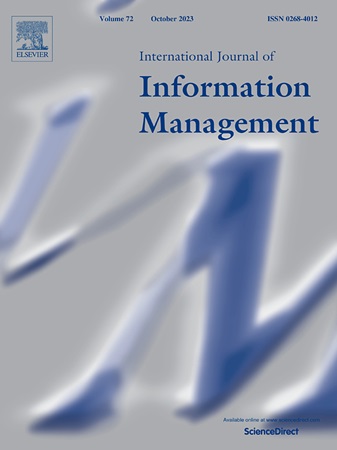Dynamics of user engagement: AI mastery goal and the paradox mindset in AI–employee collaboration
IF 27
1区 管理学
Q1 INFORMATION SCIENCE & LIBRARY SCIENCE
International Journal of Information Management
Pub Date : 2025-04-14
DOI:10.1016/j.ijinfomgt.2025.102908
引用次数: 0
Abstract
Given the scarcity of previous studies on employee–AI collaboration and its impact on employee behavior and user engagement, we investigated its potential to drive user engagement using a mixed-method approach. Grounded in qualitative findings from 27 participants in a healthcare setting, we propose a robust model that emphasizes the impact of AI–employee collaboration on AI mastery goal, user engagement, and a paradox mindset, as well as the moderating role of AI empathy and technological frames. Using a quantitative method, we collected data from 452 participants in a healthcare setting across two studies. Our findings showed that AI–employee collaboration can drive AI mastery goal and a paradox mindset. We also found empirical evidence that both AI mastery goal and the paradox mindset can mediate the relationship between employee–AI collaboration and user engagement. Moreover, our findings revealed interesting moderating results across two studies. In Study 1, significant effects were found for both employee–AI collaboration and AI mastery goal at low AI empathy, but not at high levels. In Study 2, while the interaction between employee–AI collaboration and AI empathy was not significant, the influence of AI mastery goal became significant at high empathy levels, and the paradox mindset showed a significant effect only at high levels of AI empathy. These findings provide managers with valuable insights into the essential operations dynamic of employee–AI collaboration, underscoring its important role in enhancing user engagement.
用户参与的动态:人工智能掌握目标和人工智能员工协作中的悖论心态
鉴于之前关于员工与人工智能协作及其对员工行为和用户参与度影响的研究缺乏,我们使用混合方法研究了其推动用户参与度的潜力。基于医疗保健环境中27名参与者的定性研究结果,我们提出了一个强大的模型,强调人工智能员工协作对人工智能掌握目标、用户参与度和悖论心态的影响,以及人工智能移情和技术框架的调节作用。使用定量方法,我们收集了两项研究中来自医疗保健机构的452名参与者的数据。我们的研究结果表明,人工智能员工协作可以推动人工智能掌握目标和悖论心态。我们还发现经验证据表明,人工智能精通目标和悖论心态都可以调节员工-人工智能协作和用户参与度之间的关系。此外,我们的发现在两项研究中揭示了有趣的调节结果。在研究1中,低人工智能同理心对员工-人工智能协作和人工智能掌握目标都有显著影响,而高人工智能同理心对员工-人工智能协作和人工智能掌握目标没有显著影响。在研究2中,员工-人工智能协作与人工智能共情的交互作用不显著,而人工智能掌握目标的影响在高共情水平下变得显著,悖论心态仅在高共情水平下才有显著影响。这些发现为管理人员提供了有关员工与人工智能协作的基本运营动态的宝贵见解,强调了其在提高用户参与度方面的重要作用。
本文章由计算机程序翻译,如有差异,请以英文原文为准。
求助全文
约1分钟内获得全文
求助全文
来源期刊

International Journal of Information Management
INFORMATION SCIENCE & LIBRARY SCIENCE-
CiteScore
53.10
自引率
6.20%
发文量
111
审稿时长
24 days
期刊介绍:
The International Journal of Information Management (IJIM) is a distinguished, international, and peer-reviewed journal dedicated to providing its readers with top-notch analysis and discussions within the evolving field of information management. Key features of the journal include:
Comprehensive Coverage:
IJIM keeps readers informed with major papers, reports, and reviews.
Topical Relevance:
The journal remains current and relevant through Viewpoint articles and regular features like Research Notes, Case Studies, and a Reviews section, ensuring readers are updated on contemporary issues.
Focus on Quality:
IJIM prioritizes high-quality papers that address contemporary issues in information management.
 求助内容:
求助内容: 应助结果提醒方式:
应助结果提醒方式:


